Luigi Mangione, Karl Marx, and the Origins of Monopoly
Humanizing the Times: From August 24, 2024 to December 13, 2024
Index of What’s in Store
When Egoism Makes Violence a Condition of Justice
December 13, 2024
“We don't guarantee basic social rights to people out of the kindness of our hearts,” writes
, “we do it to prevent chaos and violence.” Jilani goes on to give us a brief and valuable review of Western government’s enactment of welfare policies used to quell political rebellion against cruel establishment orders.I don't dispute the fact that the welfare state including FDR's program was inspired largely as a self-interested political necessity. Yet I think we ought to consider the ethical and practical implications of this ethical framework (social contract ethics). The unrecognized implication of such a political vision of care is that it makes violence and criminality a necessary condition for justice since if a people can be adequately subdued then there no longer exists the self-interested motivation of those with power and resources to provide the care.
To put the point directly, if our ethical framework requires a Luigi Mangione to motivate healthcare reform, then we are making violent rebellion a condition of justice. The alternative ethical framework of care, suggested to us by other cultural traditions, necessitates only an elementary compassion for human beings. But this also requires a shift away from narcissistic self-interest toward the reality of universal human dignity.
A healthier outlook would view our well-being as mutually interdependent. We would embrace Rev. Dr. Martin Luther King's ethic of love, one shared by faith and secular humanistic traditions throughout human history, and understand that even in the absence of the threats of crime and violence we have an obligation to care for human beings and honor their dignity.
Arguably it is only in a sick and pathologically self-interested society that care becomes a mere instrument of crime and violence prevention. Human nature is not monolithic and neither are our political societies. As the authors of The Dawn of Everything: A New History of Humanity (2021) show in their exhaustive book, we human beings have found numerous ways to organize society. One of the grand errors in our thinking about human societies is that we presume them to be mostly static. When in truth they have often fluctuated and changed.
We need not limit ourselves only to resolving current suffering and misery of the present by looking to the welfare state model and its motivation among elites rooted in preserving exploitative economic arrangements which concentrate wealth in a small number of hands. We might instead begin to ask serious ethical, spiritual, and existential questions of who we are and who we want to be. We might also look into the past to study not only the errors but also illuminating insights.
Consider, for example, the words attributed to the 17th-century chief of the Wendat people, Kandiaronk, who lived in the area we today refer to as Michigan. In response to an argument in favor of European society, Kandiaronk replied,
“If you abandoned conceptions of mine and thine, yes, such distinctions between men would dissolve; a levelling equality would then its take place among you as it now does among the Wendat. And yes, for the first thirty years after the banishing of self-interest, no doubt you would indeed see a certain desolation as those who are only qualified to eat, drink, sleep, and take pleasure would languish and die. But their progeny would be fit for our way of living. Over and over I have set forth the qualities that we Wendat believe ought to define humanity—wisdom, reason, equity, etc. —and demonstrated that the existence of separate material interest knocks all these on the head. A man motivated by [self-centered] interest cannot be a man of reason.”1
Some argue that social change requires coalition building and compromise. We should not focus so much on how people arrive at a given shared end so much as whether or not they are working with us to achieve that goal. To this argument I admit that a “purity” demand insisting that others not only share our policy views but must share our precise ethical framework can be too demanding.
But I also think it's important to think about how the intellectual or organizational means shape the ends, and how our framing of a cause impacts the very sustainability of the sought after outcome. Thus I raise the above critique in good faith dialogue, not as an attack.
Josh Shapiro and Selective Condemnation of Violence
December 12, 2024
On December 9th, Pennsylvania governor, Josh Shapiro responded to the arrest of Luigi Mangione, suspected of killing UnitedHealthcare CEO, Brian Thompson. “In America, we do not kill people in cold blood to resolve policy differences or express a viewpoint,” Shapiro said. “I have no tolerance, nor should anyone, for one man using an illegal ghost gun to murder someone because he thinks his opinion matters most ... he is no hero.”
Yet Shapiro fails to appreciate Rev. Dr. King’s lesson that the violence we normalize through militarism informs and shapes domestic society and policy. In September 2024 Shapiro joined Ukrainian president Volodymyr Zelensky for a publicity event in which the men signed artillery shells at a Scranton, Pennsylvania weapons manufacturer. For Shapiro, there is no contradiction between spending billions on warfare and condemning Mangione. Illegitimate violence, it seems, is that which is carried out in our civil society by those without state power.
What is needed is a genuine embrace of biophilia, a love of life. Too many in power love machines and power itself more than they love life and humanity. In The Heart of Man (1964), Erich Fromm explained necrophilia as a manner of living in which a person prizes things, control, and force over living beings, creativity, and reason.
“The necrophilous person is driven by the desire to transform the organic into the inorganic, to approach life mechanically, as if all living persons were things. All living processes, feelings, and thoughts are transformed into things. Memory, rather than experience; having, rather than being, is what counts. The necrophilous person can relate to an object—a flower or a person—only if he possesses it….”
Luigi Mangione's Manifesto
December 11, 2024
has published Luigi Mangione's 262-word statement regarding his suspected killing of UnitedHealthcare CEO, Brian Thompson. Klippenstein reports that major media outlets possess the full statement but have withheld it from the public.Media outlets including NBC and the Daily Beast have selectively quoted the handwritten statement found on the suspect at the time of his arrest. They quote Mangione as having written, “I do apologize for any strife of traumas but it had to be done. Frankly, these parasites simply had it coming.”
These outlets have intentionally omitted the rest of Mangione’s statement. Directly after stating that the “parasites had it coming,” he writes, “A reminder: the US has the #1 most expensive healthcare system in the world, yet we rank roughly #42 in life expectancy.” In August 2007, news media widely reported on findings that U.S. life expectancy was behind 41 other countries.
Mangione went on to compare UnitedHealthcare’s growth with the shrinking of life expectancy in the U.S.. “United is the [indecipherable] largest company in the US by market cap,2 behind only Apple, Google, Walmart. It has grown and grown, but as our life expectancy? No the reality is, these [indecipherable] have simply gotten too powerful, and they continue to abuse our country for immense profit because the American public has allwed [sic] them to get away with it.”
Mangione concludes by admitting that he lacks the expertise to best explain the failings of the U.S. healthcare system but notes that others including “Moore” do, a potential reference to Michael Moore and his 2007 documentary Sicko. Note that the documentary was released around the same time as the figure that the U.S. was 42nd in life expectancy was released.
“Obviously the problem is more complex, but I do not have space, and frankly I do not pretend to be the most qualified person to lay out the full argument. But many have illuminated the corruption and greed (e.g.: Rosenthal, Moore), decades ago and the problems simply remain.”
Mangione's mention of Rosenthal may be a reference to Elisabeth Rosenthal, medical doctor and author of An American Sickness (2017). “In the past quarter century,” Rosenthal explains at the start of her book, “the American medical system has stopped focusing on health or even science. Instead it attends more or less single-mindedly to its own profits.”
Mangione concludes his manifesto with the observation that knowledge of the failings of the healthcare system is not the issue. The problem is power. “It is not an issue of awareness at this point, but clearly power games at play. Evidently I am the first to face it with such brutal honesty.”
Misguided Memories
December 8, 2024
Memories can function as a form of escapism from living or as a joyful experience reminding us of just how precious life is. To embrace nostalgia—to live in backward-looking disappointment about how good things once were—is really a betrayal of life, of living. Often enough the beloved past turns out never to have been so beautiful anyway. Instead, it functions as a rationalization for not trying to live well, presently. But that doesn’t mean we can’t affirm living in the present—living in what Fromm calls the “being” mode—and cherish memories. Past experiences and connections can be a source of present joy, intellectual stimulation, or learning. We can remember and smile. We can relive, however faintly, both important pains and prized pleasures. We can and should also embrace memory as a source of context and also a renewed connection to the present, to what we might wish to do or not do today.
More Israeli Killings in Gaza
December 1, 2024
On November 30th, an Israeli airstrike killed five people including three World Central Kitchen workers. The airstrikes destroyed vehicles clearly marked with the World Kitchen logo. Without providing evidence, Israel claimed one of the people they killed participated in the October 7, 2023 attack against Israel.
Let us take stock of the moral impoverishment of not only the Israeli military but also those leaders and governments supporting the conduct of their campaign of destruction. Even if we accepted the claim that one of the five they killed was part of the October 7th attack, what of the other four killed?
The Israeli military makes no effort to even excuse their killings. It is as though the innocent no longer have dignity. Or perhaps the presumption is that there are no innocent Palestinians, none who possess dignity.
Let us never relent in declaring our faith in the inherent dignity of all persons, our belief that guilt must be proven and innocence assumed. Each life has an infinite worth independent of any function they may or may not have for others. Let us never be numb to such destruction of life.
Greed is Not Good
November 30, 2024
There’s so much to appreciate about
’s piece starting with the Adam Smith quote.“This disposition to admire, and almost to worship, the rich and the powerful, and to despise, or, at least, to neglect persons of poor and mean condition, though necessary both to establish and to maintain the distinction of ranks and the order of society, is, at the same time, the great and most universal cause of the corruption of our moral sentiments. That wealth and greatness are often regarded with the respect and admiration which are due only to wisdom and virtue; and that the contempt, of which vice and folly are the only proper objects, is often most unjustly bestowed upon poverty and weakness, has been the complaint of moralists in all ages.
—Adam Smith, The Theory of Moral Sentiments (1759), I:III, p.6
Greenbaum also discusses Erich Fromm's counter-intuitive yet profound insight that the selfish person is the opposite of a self-loving being. Grasping this insight enables us not only to navigate the social problems of our day but also difficult interpersonal relationships. Some of the people hurting most in our world appear to be “full of themselves” when they are actually experiencing a void of self and meaning. And this of course relates to Greenbaum’s larger point.
Greed and acquisition fail to quench the thirst for life. Instead, they leave us further depleted like a city dweller stranded on an island proudly drinking sea water, convinced that he possesses all the water he needs to stay properly hydrated.
The lie of so-called “ethical” egoism is that we are inherently self-interested. There is an apocryphal anecdote that is described in moral philosophy that was originally intended to support the egoist's claim:
Abraham Lincoln is being ferried about in a carriage when he hears some squealing pigs. He's headed home but demands that his driver pull over to the side. He discovers that the pigs are suffering and is able to save them. As the driver resumes bringing him home, he asks Lincoln about his altruistic action. Lincoln responds that altruism was not his motivator, he simply did not want to have nightmares tonight.
The egoist would have us believe that this story evidences egoism. But they are mistaken. A true egoist would not have the capacity to feel bad for another less they had some intrinsic interest in seeing other people or beings not suffer. Egoism and the capitalist economic system which embraces it as a virtuous characteristic of human nature distort the fact that we have a natural interest in behaving altruistically. As social beings, we naturally care for one another and derive joy from being in relation to and helping others.
The Folly of Perfect Security
November 29, 2024
To protect oneself from tragedy at any expense is folly. The human condition is inherently tragic. After all, we work very hard to develop, grow, and preserve, only to eventually witness and succumb to decay. Most of us realize that life is surely too precious to abandon to death before our time. Still, it may be part of the (genuine) hero's insight that some of life's values are too precious—too intrinsically valuable—to exchange for the postponement of the inevitable. Even as we cherish and embrace the love of life, we come to find wisdom in the acceptance of mortality.
You Don’t Know Marx
November 16, 2024
In 1961 Erich Fromm wrote Marx’s Concept of Man. Fromm wrote the book as a challenge to the distortions and misreading of Marx among both his ideological adversaries and others disingenuously or inaccurately representing his views.
Marx has not only been maligned by those fallaciously insisting the Soviet Union exemplified his ideals but also by supporters who distilled his social theory to a narrow criticism of material-economic inequality.
According to Fromm, economic analysis was merely a means by which Marx sought to achieve his larger aim of
“the spiritual emancipation of man, of his liberation from the chains of economic determinism, of restituting him in his human wholeness, of enabling him to find unity and harmony with his fellow man and with nature. Marx’s philosophy was, in secular, non-theistic language, a new and radical step forward in the tradition of prophetic Messianism; it was aimed at the full realization of individualism, the very aim which has guided Western thinking from the Renaissance and the Reformation far into the nineteenth century.”
As Fromm went on to note, this presentation of Marx’s agenda is certain to confound many. It does not match the representation of Marx by critics and many of his (narrowly focused) supporters. Simply put, we’ve lost track of Marx’s humanism.
To cite just one quote from Marx that one almost never encounters in discussions of his aim and thought:
“A being does not regard himself as independent unless he is his own master, and he is only his own master when he owes his existence to himself. A man who lives by the favor of another considers himself a dependent being. But I live completely by another person's favor when I owe to him not only the continuance of my life but also ‘its creation’; when he is its ‘source’. My life has necessarily such a cause outside itself if it is not my own creation.”3
Fromm explained,
“For Marx the aim of socialism was the emancipation of man, and the emancipation of man was the same as his self-realization in the process of productive relatedness and oneness with man and nature. The aim of socialism was the development of the individual personality. What Marx would have thought of a system such as Soviet communism he expressed very clearly in a statement of what he called ‘crude communism,’ and which referred to certain communist ideas and practices of his time. This crude communism ‘appears in a double form; the domination of material property looms so large that it aims to destroy everything which is incapable of being possessed by everyone as private property. It wishes to eliminate talent, etc., by ‘force.’ Immediate physical possession seems to it the unique goal of life and existence. The role of ‘worker’ is not abolished but is extended to all men.’”
The society Marx sought to help build was one in which our “labor” was transformed from an oppressive experience of forced drudgery and alienation to the exercise and experience of our truly human, creative powers—an expression of individual agency freed of external compulsion. You might say he sought to overthrow God's punishment after the fall, whereby men were condemned to a life of all-consuming, joyless toil. The goal was not to replace the capitalist owner, who exploited and also controlled the worker, with a new owner—the state. The goal was to return labor to the laborer, to restore freedom to all dimensions of their life including the work that was both means and end.
For our work determines not only what we do during the workday but also the people we are required to be to do such work. And some of the work demanded of human beings defiles their humanity and places dehumanizing limits on their self-actualization. To ensure laborers deprived of their dignity are better compensated is, to quote Marx, “nothing more than a better remuneration of slaves, and would not restore, either to the worker or to the work, their human significance and worth.”
“Marx’s central criticism of capitalism,” explained Fromm, “is not the injustice in the distribution of wealth; it is the perversion of labor into forced, alienated, meaningless labor, hence the transformation of man into a ‘crippled monstrosity.’”
The unthinking demonization of Marx as a thinker reveals either ignorance or a dehumanizing ideology that seems to attack the life-loving humanism at the core of his and so many others’ thinking. And none of this is to say that Marx or anyone else is beyond criticism. Truth is discovered in the dynamism of dialogue and living of life.
What the Hell is Free Parking Anyway? The Anti-monopolist Origins of Monopoly
August 24, 2024
’s exploration of the origins of the game, Monopoly inspired me to look up and learn more the first version of the game created around 1903 by a social reformer and board-game innovator, Lizzie Magie. The original game was called, The Landlord's Game. Three decades later Charles Darrow claimed to have invented Monopoly, a game later understood to have been an altered version of Magie’s game.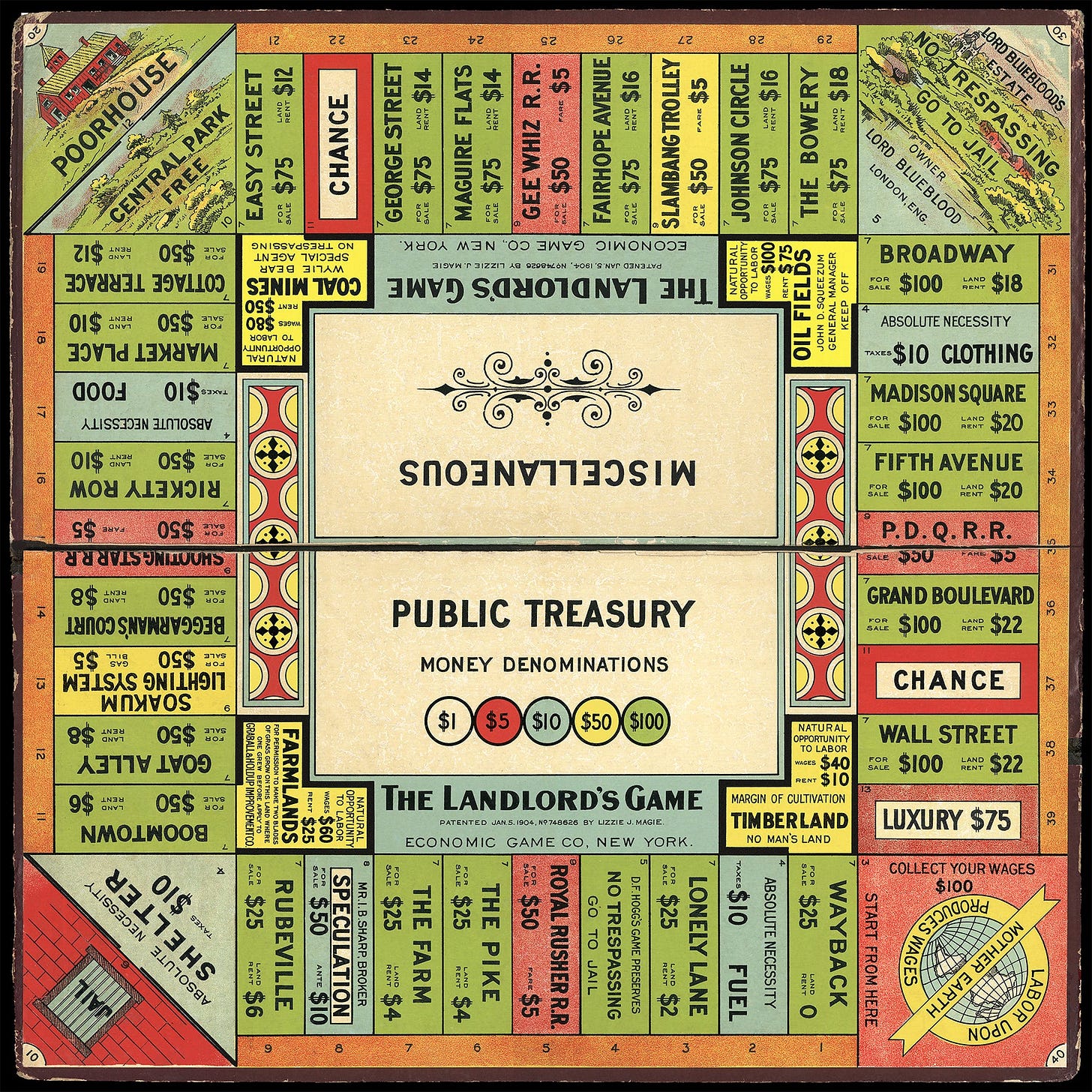
Examining the spaces was particularly illuminating. We know how the version we've all come to know works. You try to gobble up enough real-estate to bankrupt our opponents. But there are a few parts of the game that, if we think about it, don't immediately make a lot of sense. For example, why are we going to jail? What are we assumed to have done to collect money after passing go? And what is this “free parking” business?
The original game gives clear answers to these questions. We go to jail for doing things like trespassing on “Lord Blueblood’s Estates.” The aim of the game was to demonstrate American economist, Henry George's objection to the way a small number of people owned property and exploited working people's need for housing and land to live on. Rather than confiscating the land of the wealthy, George argued it should be taxed based on its value so the public could reclaim their lost wealth. He also advocated for public management of transportation and utilities, and held that such essentials should be made available for minimal costs.
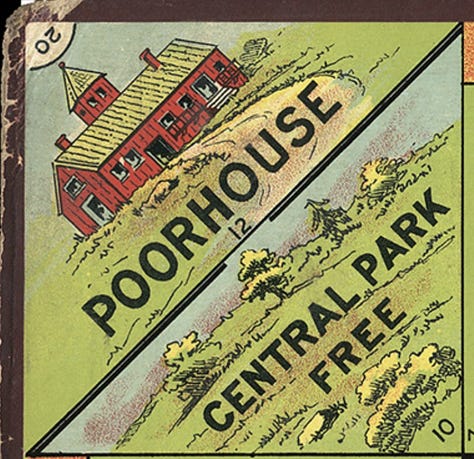
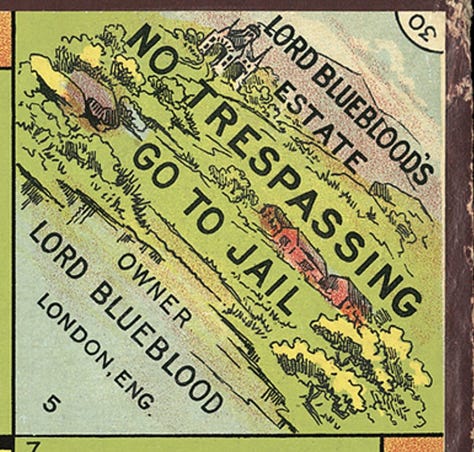
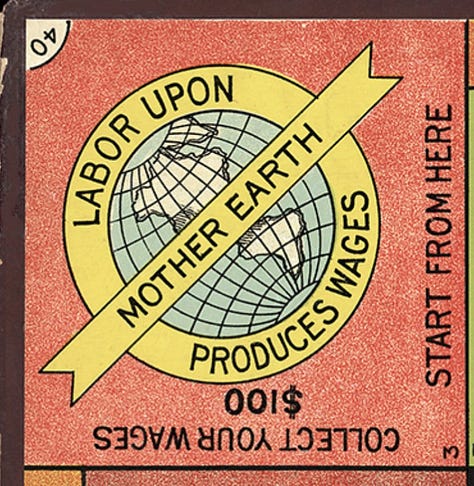
OK, but why do we receive money for passing “Go”? The spot on the board we call “Go” originally read, “Labor upon mother earth produces wages.” The money players get on the Go space represents the money we laborers make by the sweat of our brow, money earned through work rather than exploitation.
This leaves us with the question of what the heck “Free Parking” is meant to represent. Instead of “Free Parking,” The Landlord's Game has a space named “Poorhouse/ Central Park: Free.” This space on the board was meant to represent the few options available to impoverished people incapable of purchasing real-estate or paying rent. As a poorhouse, this space represented a place where local government provided temporary relief in the form of housing and food to those in desperate need. As Central Park it was a public space. In other words, it was part of the commons not yet confiscated by concentrated capital and therefore a place where a person might rest their weary head without being sent to jail. Free Parking doesn't cost money and won't put you in jail. It's one of the rare spots in the board where a person may simply exist.

Taken together, the game of Monopoly as we came to contemporarily know it obscured two facts about the game’s origin. First, it hid the game’s female originator, Lizzie Magie, when a man took credit for its creation. Second, the very intent of the game to challenge concentrated economic power and injustice was muted in the game’s redesign.
Please share and like this post by clicking the heart icon.
Invite Dr. Nall to Speak
Dr. Nall delivers energetic live presentations and engaging workshops on the subjects featured in Humanities in Revolt. Those interested in booking a workshop or talk can get in touch through Facebook or by leaving a comment.
This quote is featured in chapter two, “Wicked Liberty: The indigenous critique and the myth of progress,” in The Dawn of Everything. The original source is “A Conference or Dialogue Between the Author and Adario, a noted Man among the Savages” by Frenchman, Louis-Armand de Lom d’Arce de Lahontan, Baron de Lahontan. The dialogue is published in the second volume of Lahontan’s 1703 book, New Voyages to North America. You can read the dialogue here, downloading the document (for free) from Brown University’s digital library and going to page 118. You can also purchase a newly published physical copy of the dialogue here.
As of December 19, 2024, UnitedHealthcare was the 17th largest U.S. company by market capitalization or the market value of a company’s stocks.
From Marx’s Economic and Philosophical Manuscripts (1844).

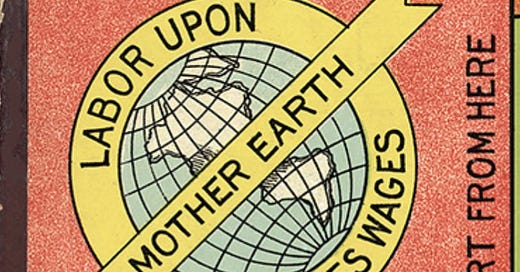


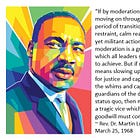
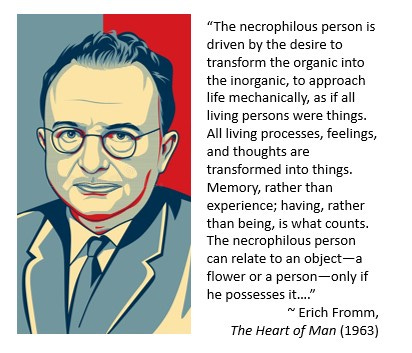





Thank you, Jeffrey, for including me in this exhaustive list of articles worth reading. There is a common theme, of course, that when humans act in a cooperative way, not with aggression and violence (this includes economic violence), we are all better as a result. Happy holidays.
To put the point directly, if our ethical framework requires a Luigi Mangione to motivate healthcare reform, then we are making violent rebellion a condition of justice.
(Great point!)